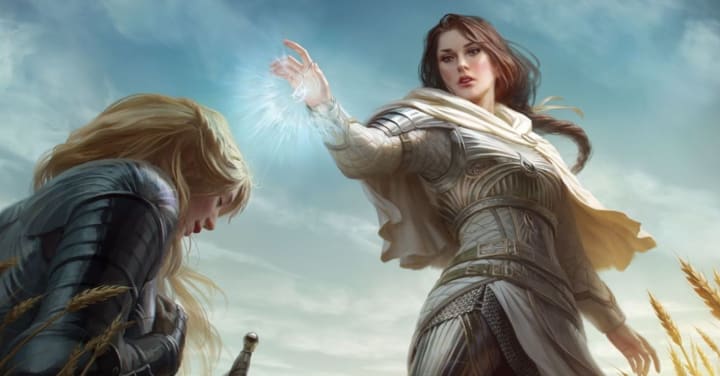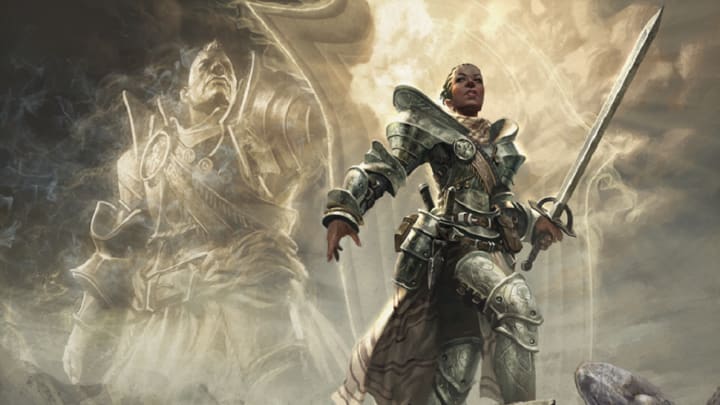What your favorite D&D class says about you
Who needs astrology when you have dice?

It's wild how quickly Dungeons and Dragons went from the sole domain of nerds to the mainstream success it is. With hit podcasts like Critical Role and the Adventure Zone even branching out into other forms of media, D&D's never been more socially acceptable or widespread.
With 12 playable classes in the Player's Handbook (PHB, for the uninitiated) there's a class for everyone to enjoy and maybe even identify with. And while you'll likely take more than one class for a spin over multiple campaigns, I've found that a lot of D&D players not only have a favorite class but that their favorite class can say a lot about them.
So, without further ado, let's talk classes.
Barbarian

In D&D, Barbarians are powerful warriors who use their rage to fuel their strength in battle. Boasting the largest hit die in the game and taking reduced damage while they're raging, Barbarians are frontline combatants who can dish out and take tons of damage.
People who favor Barbarians likely play them because of how simple-but-effective they are in combat. When it comes to roleplaying, these players are often content to let others lead the conversation. Those who do participate in the roleplaying, however, are more likely to favor blunt and/or comedic characters.
Barbarian-mains tend to be impatient. Jumping from one activity to the next, Barbarian-mains don't want to wait around for lengthy discussions when they've made up their minds. They're also protective, always ready to jump to the defense of someone they care about.
Bard

Bards are what you get when you apply magic to artistry. Able to buff allies, debuff enemies, cast spells, and play a jaunty little tune in the middle of combat, Bards are for people who like to solve problems with words and creativity. (Sometimes those words are spells.)
A fan favorite, the "horny Bard" trope is both a meme and incredibly common at tables. Because Bards can easily get the best bonuses to social skills seducing, deceiving, and otherwise indirectly solving encounters is common to the class. They often lead roleplay encounters, and like Barbarians are likely to lean into comedic aspects.
People who prefer Bards tend to be avid communicators or creative artists. They enjoy looking at a challenge from angles others may not have considered. As a jack-of-all-trades, they also enjoy having a variety of options at their disposal.
Cleric

Often reduced to "the healer" in a lot of minds, Clerics are incredibly versatile casters who can use their divine power to tank damage, fight in melee, support from the back, damage and debuff enemies, and... yeah, okay, heal themself and others. Don't discount the power this class packs, though, they're more than the party nursemaid.
Most Clerics excel in combat situations, using their divine magic to support their allies. Of course, some subclasses give the Cleric additional strengths, like Trickster Domain providing stealth and utility and Knowledge Domain providing extra insight, but base Cleric spells are mainly useful in-combat.
Cleric players are dedicated and passionate. Even the soft-spoken among them will likely have a topic they're deeply invested in and may get very animated when talking about it. Beware when criticizing a Cleric-main's interests, as that passion can quickly become fury.
Druid

The rarest of the PHB classes, druids are extensions of nature's grace, fury, and mercy. Providing some of the most utility in D&D, Druids can control the battlefield, heal the wounded, summon or transform into beasts for combat, stealth, or exploration, and so much more.
In-game, Druids have an answer to nearly any problem your party will face. The only areas they don't typically excel in are social situations, and their damage per round tends to be on the lower end of the spectrum. Still, a Druid can lock down the battlefield in their party's favor and make sure their allies are healed up, more than making up for their lower damage.
People who play Druids are similar to Bard players, in that they like to find creative solutions to problems, but a Bard-main will use words where a Druid-main takes action. They tend to be very relaxed, unassuming people who take the world as it is.
Fighter

A staple in any party, Fighters are skilled combatants who can effectively use just about every weapon. Fighters are differentiated by how they approach combat. Some may prefer to rain death on their enemies with a bow, others take the fight to the enemy's face with a sword and shield, and others will master any other variety of weapons.
The sheer versatility of a Fighter means they'll always have options in combat, so long as they're properly equipped. They have some of the highest damage per round potential in the game, especially with their Action Surge class feature.
Fighter-mains are dependable people. Some might say they're boring, but everyone appreciates the stability they bring. Sometimes stubborn and inflexible, Fighter-mains know where the borders of their comfort zones are.
Monk

The class for people who just want to punch a dragon, Monks are ascetic warriors who train their bodies and minds to turn themselves into deadly weapons. The intense training and discipline of a monk allows them to rid their body of poisons, purge their mind of magic, and even run up walls or on the surface of water.
Monks utilize their extra mobility to maneuver the battlefield, making it difficult for enemies to keep their distance or close the distance on the Monk. They can lock enemies down with a Stunning Strike, protect themselves with patient defense, and deal additional damage with Flurry of Blows. The only limiting factor of a Monk is their Ki Point resource.
People who enjoy Monks don't often share the Monk's sense of discipline. Instead, they're quick-witted people with a strong sense of individuality and self-sufficiency.
Paladin

Holy (or Unholy) warriors who smite their enemies with divine power, Paladins are blessed with otherworldly power by their devotion to their oaths. The nature of the oath depends on the Paladin, but so long as they stay true to their oath they gain incredible power.
Paladins in-game are almost exclusively found on the frontline, as their Divine Smite class feature requires the use of melee weapons. An incredibly versatile warrior, Paladins can excel in social encounters, tank damage, heal their allies, cast spells, and deal massive amounts of damage.
Paladin-mains share the Paladin's sense of order. They tend to be inflexible in their beliefs, which is both a strength and weakness. They are incredibly loyal and honest people.
Ranger

Wilderness survivalists and independent warriors, Rangers wield bow, sword, and nature magic to fight their enemies and assist their allies. They're known for developing strong connections with animal companions, and while they're not restricted to using a bow they're often considered the "archer class."
Rangers in combat tend to favor the bow or use finesse weapons in melee. They're lithe and dexterous, using their magic to bolster their attacks and help them weave in and out of the fray. Rangers with an animal companion will also spend combat maneuvering their companion into advantageous positions.
People who main Rangers are often people who love animals, and chose the Ranger because of their connection to the natural world. They tend to be more reserved and may have been attracted to the Ranger class because the class is painted as independent.
Rogue

One of the fantasy staple archetypes, Rogues are most widely recognized as thieves, assassins, and spies in fiction. Often stealthy and sticky-fingered, in D&D Rogues are skilled and precise. If the Bard is the jack-of-all-trades when it comes to skills, the Rogue is the specialist.
In combat, Rogues depend on their Sneak Attack feature to deal massive damage in a single, calculated strike. Because Sneak Attack has specific requirements Rogues often use their other class features, like bonus action hiding, to ensure they can get the extra damage every turn.
People who main Rogues are often chaotic and enjoy the criminal-adjacent flavor of the Rogue, even if they're playing the hero. They're often mischief-makers and like to shake things up or use subtle methods of problem-solving.
Sorcerer

Spellcasters whose power comes from within, Sorcerers often inherit their magic from a powerful magical ancestor. Yes, this means that someone in your family tree probably did the "horizontal hello" with a dragon at some point, but at least you got some sweet magical power out of it.
Sorcerers know the fewest spells of all the spellcasters, so they often choose magic that allows them the greatest flexibility. Just kidding, Sorcerers are here to blow things up. They can use Metamagic to alter their spells, making them deadlier, more effective, or subtle.
Sorcerer-mains are often attracted to the idea of having innate power and enjoy being a mobile artillery caster. They are often chaotic party members and real-life friends. Like Rogue-mains they like to shake things up, but they lack the subtlety and tend to be more direct.
Warlock

Warlocks are spellcasters who gained their magic through a pact with a powerful being. They are some of the most customizable characters, due to the sheer number of Pacts, Invocations, and Spells to choose from. They have a unique spell slot system that recovers on a short rest.
Warlocks in combat tend to focus on their Eldritch Blast cantrip, a spell that almost acts like a replacement for weapon attacks. Popular builds also include putting the Warlock in melee, however, and between the Hexblade subclass and Pact of the Blade, they have plenty of options for wading into melee.
Warlock-mains are often attracted to the Warlock because of the customization options. These are people who don't like to be pigeonholed, they want to be able to express themselves and change their strategy on the fly, even if they're going to choose the same thing most of the time.
Wizard

The nerd's nerd, Wizards are spellcasters who mastered magic through study and practice. They have the broadest selection of spells but must add them to their spellbook in order to cast them. They can do this by leveling up or by finding scrolls or spellbooks to copy.
A Wizard in combat is defined by the spells they chose that day. They can blast enemies, like the Sorcerer, or control the battlefield with spells that limit enemies or buff allies. Their real value is their utility, and a Wizard can fulfill any role in a party with the right spell selection.
Wizard-mains are people who love to solve problems. They like to defy expectations with innovative solutions, surprise the people around them with unexpected knowledge, or just spend time understanding something that was once unknown to them. What nerds.
Conclusion
And that's it for my breakdown of what your main class says about you. Please, don't take this seriously. If your favorite class doesn't match you that says more about the stereotypes associated with the class than anything else. Play the class that looks the most fun, or you enjoy playing the most! As long as everyone at the table is having fun, there are no wrong answers in D&D.
About the Creator
Timmy Snow
A freelance writer with a wide focus, Timmy mainly tries (and fails) to stick to topics relating to Geek Culture, like gaming and comics. You'll also find him writing about LGBTQ+ rights, Indigenous rights, general politics, and satire.






Comments
There are no comments for this story
Be the first to respond and start the conversation.